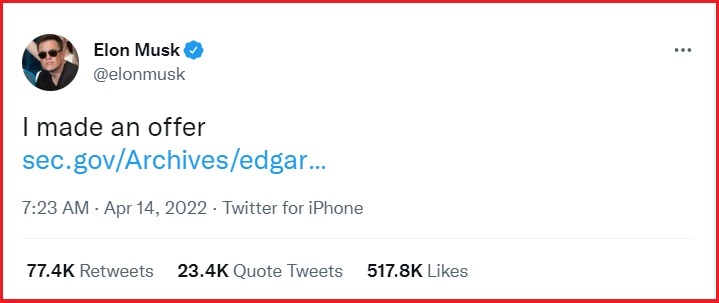CTH | The metaphorical Jack had a great idea, open a coffee shop where the beverages were free and use internal advertising as the income subsidy to operate the business. Crowds came for the free coffee, comfy couches, fellowship, conversation and enjoyment.
It didn’t matter where Jack got the coffee, how he paid for it, or didn’t, or what product advertising the customers would be exposed to while there. Few people thought about such things. Curiously, it didn’t matter what size the crowd was; in the backroom of Jack’s Coffee Shop they were able to generate massive amounts of never-ending free coffee at extreme scales.
I predict essentially identical censorship/deplatforming policies across all layers of the legacy Internet stack. Client-side & server-side ISPs, cloud platforms, CDNs, payment networks, client OSs, browsers, email clients. With only rare exceptions. The pressure is intense.
— Marc Andreessen (@pmarca) April 16, 2022
Over time, using the justification of parking lot capacity and township regulations, not everyone would be able to park and enter. Guards were placed at the entrance to pre-screen customers. A debate began.
Alternative coffee shops opened around town. It was entirely possible to duplicate Jacks Coffee Shop, yet no one could duplicate the business model for the free coffee. Indeed, there was something very unique about Jack’s Coffee Shop. Thus, some underlying suspicions were raised:
The only way Twitter, with 217 million users, could exist as a viable platform is if they had access to tech systems of incredible scale and performance, and those systems were essentially free or very cheap. The only entity that could possibly provide that level of capacity and scale is the United States Government – combined with a bottomless bank account. A public-private partnership.
If my hunch is correct, Elon Musk is poised to expose the well-kept secret that most social media platforms are operating on U.S. government tech infrastructure and indirect subsidy. Let that sink in.
The U.S. technology system, the assembled massive system of connected databases and server networks, is the operating infrastructure that offsets the cost of Twitter to run their own servers and database. The backbone of Twitter is the United States government.
FREE COFFEE:
♦ June 2013: […] “Cloud computing is one of the core components of the strategy to help the IC discover, access and share critical information in an era of seemingly infinite data.” … “A test scenario described by GAO in its June 2013 bid protest opinion suggests the CIA sought to compare how the solutions presented by IBM and Amazon Web Services (AWS) could crunch massive data sets, commonly referred to as big data.” … “Solutions had to provide a “hosting environment for applications which process vast amounts of information in parallel on large clusters (thousands of nodes) of commodity hardware” using a platform called MapReduce. Through MapReduce, clusters were provisioned for computation and segmentation. Test runs assumed clusters were large enough to process 100 terabytes of raw input data. AWS’ solution received superior marks from CIA procurement officials”… (MORE)
♦ November 2013: […] “Twitter closed its first day of trading on Nov. 7, 2013, at $44.90 a share. In the years since then, it briefly traded above $70, but more recently, it has struggled.”
Jack’s free coffee shop has been for sale, but there’s no viable business model in the private sector. No one has wanted to purchase Twitter – it is simply unsustainable; the data processing costs exceed the capacity of the platform to generate revenue – until now….



0 comments:
Post a Comment